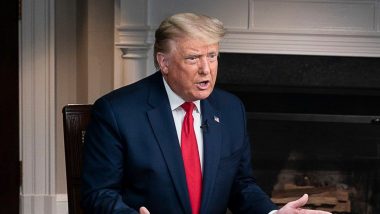Nicosia, January 18: In what could be the last act of President Donald Trump, US Secretary of State Mike Pompeo announced on 10 January that the US Administration would designate Yemen's Ansar Allah movement (Houthis) as a terrorist organization.
He added that the designation would take effect on 19 January, i.e. the day before Trump leaves office and (President-elect Joe) Biden is sworn in. This move is expected to exacerbate further the grave humanitarian situation in Yemen, this poor, worn-torn country in the Arabian Peninsula, about which the UN Secretary-General Antonio Guterres warned that "now is in imminent danger of the worst famine the world has seen for decades." Saudi-Led Coalition Forces Destroy Missile Fired by Houthis from Yemen Targeting Saudi Arabia.
Pompeo insisted that the move would "deter further malign activity by the Iranian regime", while he stressed that the US administration plans "to put in place measures to reduce their impact on certain humanitarian activity and imports into Yemen."
He added that the US is prepared to work with the United Nations and aid groups to help the humanitarian effort. Pompeo said that licenses and guidance would also apply to certain humanitarian activities conducted by non-governmental organizations in Yemen and to certain transactions and activities related to exports to Yemen of critical commodities like food and medicine.
Houthis, who profess a sect of Shiite Islam, captured Yemen's capital Sanaa, along with much of the country's north-western territory in late 2014 and 2015. The region borders Saudi Arabia, which together with the United Arab Emirates, supports militarily the internationally recognised government of President Abdrabbuh Mansour Hadi that was ousted by the Houthis, who are backed by Iran.
The conflict escalated in 2015 when a Saudi-led coalition launched a military operation to defeat the Houthis and restore PresidentHadi's rule. In the ensuing civil war, it is believed that more than 110,000 people were killed.
The lack of safe drinking water, caused by depleted aquifers and the destruction of the country's water infrastructure, has also caused the largest, fastest-spreading cholera outbreak in modern history, with the number of suspected cases exceeding 1 million. Yemen is also facing an outbreak of the covid-19 pandemic.
Mark Lowcock, United Nations Under-Secretary-General for Humanitarian Affairs and Emergency Relief Coordinator, speaking during a recent Security Council videoconference meeting, said that the most urgent priority in Yemen right now is to prevent a massive famine. Sixteen million Yemenis are poised to go hungry this year, and about 50,000 already find themselves in the midst of a small famine, he said, adding: "Every decision the world makes right now must take this into account." He also stressed the fact that Yemen imports 90 per cent of its food -- with nearly all that food entering through commercial channels that aid agencies cannot replace.
David Beasley, Executive Director of the United Nations World Food Program (WFP), has said that even without the designation of Houthis as terrorists, famine looms, with 11 million people already in crisis and 5 million at an emergency level. "To stave off famine, at least USD 1.9 billion is needed for 2021, as only USD 386 million in confirmed contributions have been received... The shortage means 9 million people now receive half-rations, and without required assistance, starting in February, only quarter-rations can be provided. The designation (of Houthis as a terrorist organization) is going to be a death sentence to hundreds and thousands, if not millions."
What is quite disappointing, is that every time there is a glimmer of hope in Yemen, it is almost immediately frustrated by an adverse event or action, which overturns any progress made. This happened again on December 30 2020, when a plane carrying members of the recently formed Yemeni government landed at Aden International Airport in the southwest of Yemen.
As passengers disembarked, there were explosions and gunfire, leaving 28 people dead and 107 others injured. None of the passengers were hurt in the attack and the Yemeni cabinet members were quickly transported to Masquid Palace for safety. Later, an attack also occurred near the Palace.
Yemen's Foreign Minister Ahmad Awad bin Mubarak initially blamed the Houthis for the attack, but provided no evidence substantiating the claim. The Houthis denied responsibility and put blame on the continued infighting between the government and the Southern Transitional Council, which they said was the party most likely to have carried out the attack.
On 10 January US Secretary of State Mike Pompeo announced that he intended to designate the Houthis as a Foreign Terrorist Organization, using the airport attack as an example of the Houthis' terrorist capabilities.
Mark Lowcock, United Nations Under-Secretary-General for Humanitarian Affairs and Emergency Relief Coordinator, has said that the most urgent priority in Yemen right now is to prevent a massive famine. He added that he was not questioning the intent of the US administration's decision.
However, he emphasized that its likely humanitarian impact will be "a large-scale famine on a scale that we have not seen for nearly 40 years. Licences and exemptions for aid agencies will not prevent that, but a reversal of the decision will", he concluded.













 Quickly
Quickly





















